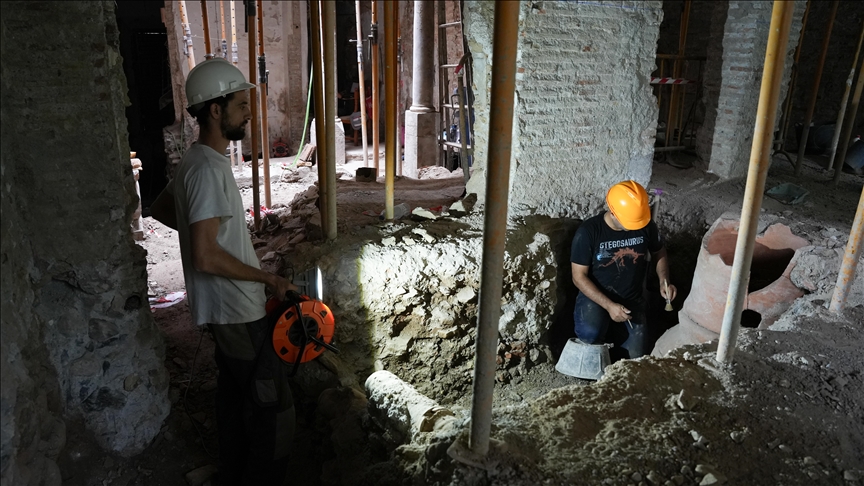Another Muslim Andalusian cemetery discovered in Spain's Granada
3 of 8 Muslim cemeteries discovered in historical part of city, once capital of Emirate of Granada
 An archeologist works on human remains, presumably belonging to Muslims Cemetery from the Andalusian Islamic era (711-1492) found during an excavation in Granada, Spain on September 16, 2023.
An archeologist works on human remains, presumably belonging to Muslims Cemetery from the Andalusian Islamic era (711-1492) found during an excavation in Granada, Spain on September 16, 2023.
GRANADA, Spain
A centuries-old Muslim cemetery in Granada, a major city in the Andalusia region in southern Spain, has been unearthed during excavations being carried out during a building's restoration.
Eliminated during the subsequent Catholic Monarchs period, the over-700-year Andalusian Islamic rule has left traces now being sought in and around Granada, the former capital of an emirate that reigned between the 13th and 15th centuries and was the last known Muslim state in the Iberian Peninsula.
Archaeologist Amjad Suliman, who is conducting research on the Andalusian Islamic civilization, told Anadolu that they unearthed one of eight Muslim cemeteries in the city during excavations on the grounds of a building in the ancient city center of Granada, in the area known as "Bab al-Fukhareen," or Potters' Quarter.
Stating that two other cemeteries had also been found, Suliman said they so far uncovered the remains of more than 40 Muslims in the Potters' cemetery, and that a total of about 150 Muslims were thought to be buried in the small area.
"Granada was the last place of refuge for Muslims in Andalusia, and the density of burials in the ancient graves unearthed here shows us how high the number of Muslims living at that time was," Suliman explained.
Stating they understood that the human remains belonged to Muslims by inspecting the way they were buried and the objects around them, Suliman added that during the dig, they reached three underground layers of graves, along with many pieces of pottery with Arabic inscriptions similar to those in the Alhambra Palace, which was built in mid-13th century Granada.
Noting that consulting archaeologists has been obligatory in construction and restoration work in Andalusia since 1995, Suliman said:
"In the past, human remains found during construction works were either buried again in the ground and built on top of them, or thrown away. Especially in the last 20 years, these works have become much more organized ... done in a controlled manner."
"In the excavations carried out so far, when we count only the documented ones, the remains of more than 10,000 Muslims have been unearthed," he added.
The remains removed from floors of buildings or plots of land, are buried in current Muslim cemeteries in the region after their anthropological analysis is complete.
Today, about 40,000 Muslims live in Granada, the majority of whom are immigrants.
Anadolu Agency website contains only a portion of the news stories offered to subscribers in the AA News Broadcasting System (HAS), and in summarized form. Please contact us for subscription options.







